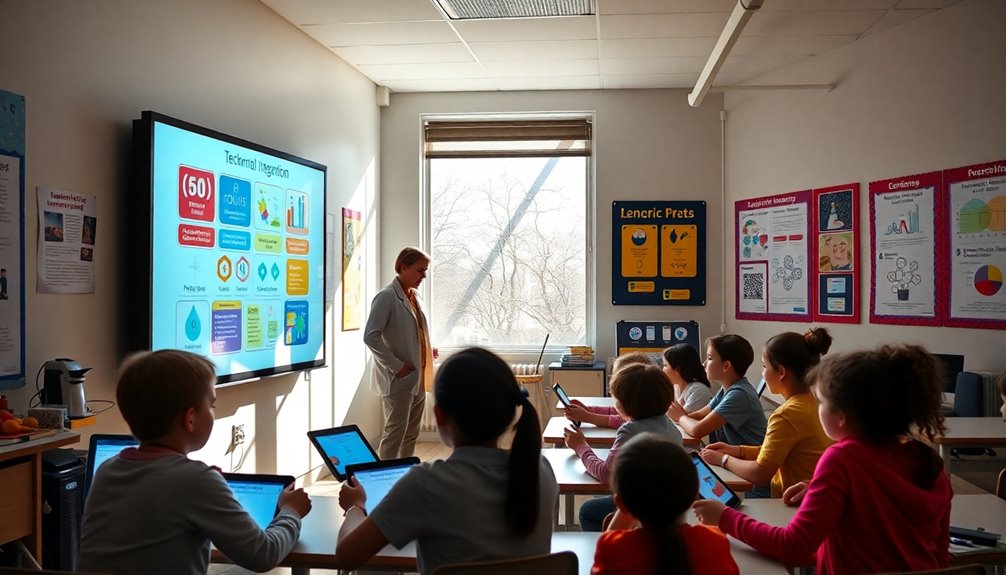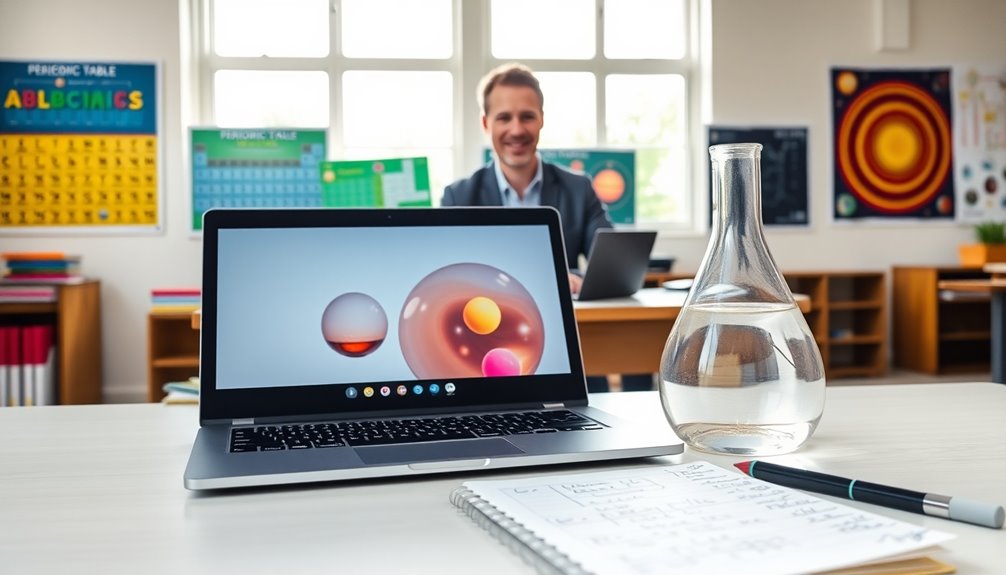To crack the code for your science teacher interview, start by defining your job preferences, whether full-time or part-time. Prepare for common questions about your motivation and classroom management strategies. Clearly articulate your teaching philosophy, emphasizing hands-on activities and support for diverse learners. Highlight effective classroom management techniques that foster collaboration and respect. Don't forget to showcase your tech integration skills and how you keep lessons engaging and relevant. By focusing on these key areas, you'll boost your confidence and readiness. There's even more to explore to elevate your interview skills and stand out to potential employers.
Key Takeaways
- Clearly articulate your motivation for teaching and how it aligns with the school's mission and values during the interview.
- Prepare specific examples of engaging activities that demonstrate your commitment to hands-on and collaborative learning in science.
- Develop a well-defined classroom management plan that emphasizes respect, clear expectations, and constructive feedback to foster a positive environment.
- Showcase your ability to integrate technology effectively in lessons, using tools that enhance student learning and engagement in scientific concepts.
- Reflect on your teaching philosophy and explain how it supports diverse learners and connects science to real-world applications.
Understanding Job Preferences

Understanding your job preferences is essential when preparing for a science teacher interview. Think about whether you want a full-time, part-time, contract, or temporary position. Knowing your preference helps you tailor your applications and enhances job recommendations.
Flexibility can be a game-changer; being open to various job types may increase your chances of landing a role that fits your lifestyle. Reflect on your ideal work environment, including factors like school culture and the age group you wish to teach.
This clarity not only boosts your confidence but also allows you to articulate your goals during the interview. Ultimately, aligning your preferences with the opportunities available can make your job search more effective and fulfilling.
Preparing for Common Questions

Knowing your job preferences sets a solid foundation for your interview preparation, particularly when it comes to anticipating common questions. You should expect to discuss your motivation for teaching, your views on classroom management, and examples of how you engage students.
Familiarize yourself with these topics and prepare thoughtful responses. Think about specific experiences that highlight your skills and passion for science education. Practice articulating your answers to build confidence, but guarantee they remain authentic to your teaching style.
Additionally, research the school's values and mission; this knowledge will help you tailor your responses effectively. Remember, the goal is to demonstrate not just your qualifications, but also your fit with the school's culture and your commitment to student success.
Crafting Your Teaching Philosophy

Your teaching philosophy is a reflection of your beliefs and values as an educator, guiding how you approach science instruction. To craft a compelling philosophy, identify your core beliefs about learning and teaching.
Consider how you want to engage students, emphasizing hands-on activities and collaborative learning, which are essential in science education. Reflect on your goals: Do you aim to spark curiosity, encourage critical thinking, or foster a love for exploration?
Articulate how you'll support diverse learners, ensuring everyone feels included and valued in your classroom.
Finally, connect your philosophy to real-world applications, demonstrating how science is relevant to students' lives. This clarity won't only guide your teaching but also impress interviewers with your thoughtful approach.
Effective Classroom Management

Effective classroom management is essential for creating a positive learning environment where students can thrive. To achieve this, you need to establish clear expectations from day one. Set rules that promote respect and collaboration among students, fostering an atmosphere where everyone feels safe to express their ideas.
Use interactive strategies to keep students engaged and actively participating in the learning process. Regularly check for understanding and provide constructive feedback to guide their progress.
Organizing assignments and grading efficiently will also help maintain order and reduce stress for both you and your students.
Integrating Technology in Lessons

In today's classrooms, integrating technology into lessons can greatly enhance the learning experience. You can use tablets and scientific applications to facilitate research and engage students in hands-on activities.
Incorporating experiment monitoring systems allows you to track progress in real-time, making science more interactive. When you prepare examples of technology integration, think about how tools can simplify complex concepts.
Don't forget to adapt your approach continuously, staying updated on emerging technologies. This adaptability not only enriches your teaching but also helps struggling students grasp challenging material. Additionally, utilizing community resources, like local science centers, can provide valuable content and context for your lessons, bridging the gap between theory and real-world application.
Moreover, leveraging smartphone merchant services can facilitate payments for field trips or science supplies, enhancing the overall educational experience.
Enhancing Student Engagement

Engaging students in science lessons can make a significant difference in their understanding and retention of material. By connecting lessons to real-life situations and using visual aids, you can spark curiosity and motivate students. Consider incorporating guest speakers to illustrate practical applications of science, enhancing the learning experience.
| Engagement Strategy | Emotional Impact |
|---|---|
| Real-world connections | Makes learning relevant |
| Visual aids | Captures attention |
| Interactive discussions | Fosters collaboration |
| Hands-on experiments | Creates excitement |
| Guest speakers | Inspires future aspirations |
Focusing on Professional Development

Professional development plays an essential role in your growth as a science teacher.
It's crucial to continuously refine your skills and adapt to new challenges. Here are some key aspects to focus on:
- Reflect on your teaching practices and identify areas for improvement.
- Attend workshops and conferences to gain new insights and methodologies.
- Collaborate with colleagues to share experiences and strategies.
- Seek feedback from mentors and peers to enhance your effectiveness.
- Set specific teaching goals for the next five years to guide your development. Additionally, consider reading the best parenting books to gain insights into effective communication and emotional intelligence, which can enhance your interactions with students.
Frequently Asked Questions
What Are Your Strengths and Weaknesses as a Teacher?
When asked about your strengths and weaknesses as a teacher, focus on your ability to engage students and foster a collaborative environment.
You might say you're great at making complex topics accessible and creating interactive lessons.
For weaknesses, consider mentioning areas like classroom management or time management where you've sought improvement.
Emphasizing your commitment to growth shows self-awareness and a dedication to becoming a better educator, which interviewers appreciate.
How Do You Handle Difficult Parents or Guardians?
Picture a ship maneuvering through stormy seas—when dealing with difficult parents, you steer with patience and clear communication.
You listen actively to their concerns, showing empathy and understanding. By providing regular updates on their child's progress, you build trust.
If necessary, you set up meetings to guarantee everyone's on the same page, focusing on solutions rather than problems.
Your goal is to foster a positive partnership for the benefit of the student.
What Is Your Approach to Professional Collaboration With Colleagues?
When it comes to professional collaboration with colleagues, you make it a priority to foster open communication and mutual respect.
You actively participate in team meetings, sharing ideas and resources that enhance teaching strategies. By seeking input from others, you create a supportive environment that benefits everyone.
You also value feedback, using it to refine your methods. Together, you and your colleagues can create a cohesive educational experience for your students.
How Do You Assess Student Learning and Progress?
How do you truly know if your students are grasping the material? You assess their learning and progress through a mix of formative and summative assessments.
Regular quizzes, class discussions, and hands-on projects help gauge understanding. You can also use student reflections and peer evaluations to provide insight.
Can You Describe a Successful Lesson You've Taught?
When you describe a successful lesson you've taught, think about a specific example that highlights student engagement and understanding. Maybe it involved hands-on experiments or real-world applications that connected with their interests.
Share how you set clear objectives, used interactive strategies, and encouraged discussions. Emphasize the positive feedback from students and how their enthusiasm reinforced your teaching methods.
This approach shows your effectiveness and dedication to fostering a dynamic learning environment.
Conclusion
To sum up, preparing for your science teacher interview is all about showcasing your strengths and passions. While you might worry about standing out among other candidates, remember that your unique experiences and teaching philosophy can set you apart. Emphasize your commitment to student engagement and continuous learning, and don't shy away from sharing specific examples. By confidently articulating your vision and strategies, you'll demonstrate your readiness to inspire the next generation of scientists. Good luck!
Eugene brings a fresh, dynamic voice to our platform as one of our talented Writers. Specializing in research-driven content, he explores the latest findings in psychology and personal growth, translating them into actionable insights for our readers. Eugene’s work is fueled by a curiosity about what makes us tick and a desire to help others unlock their potential.










